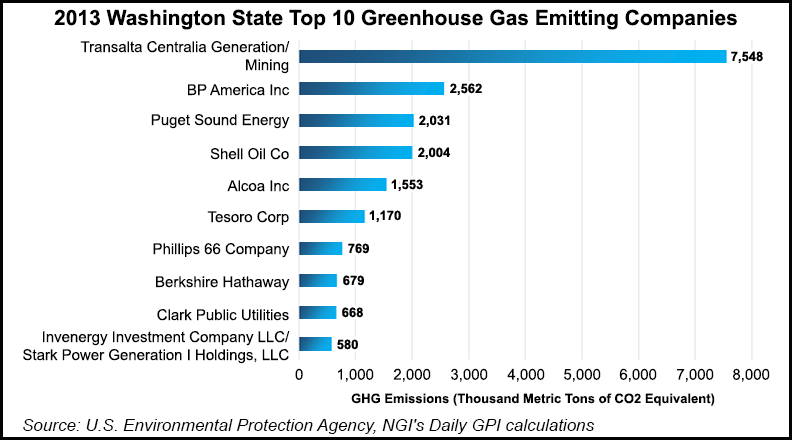Regulatory | NGI All News Access
Washington Governor Looks to GHG Cap-and-Trade
Washington Gov. Jay Inslee last Tuesday proposed establishing a cap-and-trade system for carbon emissions, estimating that it could generate $1 billion annually in state revenue and help fulfill his climate change mitigation goals along the lines of California’s approach.

A cap-and-trade program would seek to meet a six-year-old state legislative mandate to slash greenhouse gas (GHG) emissions in the state by requiring large industrial polluters to pay for each ton of carbon they release.
Inslee estimated that his plan would raise nearly $1 billion in its first year to fund transportation and education programs. However, state Republicans told local news media after the governor’s state-of-the-state speech that they do not support Democrat Inslee’s proposal.
Inslee said clean energy is one of three major issues needing to be addressed to ensure Washington state’s future economic growth, coming off a two-year period in which 150,000 jobs were added in the state.
Among the three issues (education and transportation are the others), “fighting carbon pollution will put us on the right course,” Inslee said in a speech that emphasized “reinvesting in Washington.”
“We face many challenges, but it is the growing threat of carbon pollution that can permanently change the nature of Washington as we know it,” he said, adding that he has a “moral obligation” to take action. A state that leads in aerospace and software “now can lead the world in clean energy.”
Inslee said that in approaching cap-and-trade Washington is not acting alone, because other nations and states that account for more than half the world’s carbon emissions have adopted limits. “When we work together with other states and nations, we can do something even bigger,” he said.
Since 2008, Alaska, Canada’s British Columbia and the three Pacific Coast states of California, Oregon and Washington have operated the Pacific Coast Collaborative to work together on energy and climate issues (see Daily GPI, July 2, 2008). “[Together] we become a region of 53 million people comprising the world’s fifth-largest economy, so this is the kind of collaboration that can move the world,” Inslee said.
Washington must work toward carbon limits set by the collaborative in 2008, Inslee said, proposing “a comprehensive solution that caps carbon emissions, creates incentives for clean technology and transportation, invests in energy efficiency and makes our own government operations more efficient.”
He said programs to address carbon emissions can create economic opportunities for the state and region. “I’ve seen companies in Washington moving full steam ahead to seize these opportunities and create jobs,” Inslee said, adding that carbon emissions are already being successfully addressed in 10 states and 35 countries.
© 2024 Natural Gas Intelligence. All rights reserved.
ISSN © 1532-1231 | ISSN © 2577-9877 |
